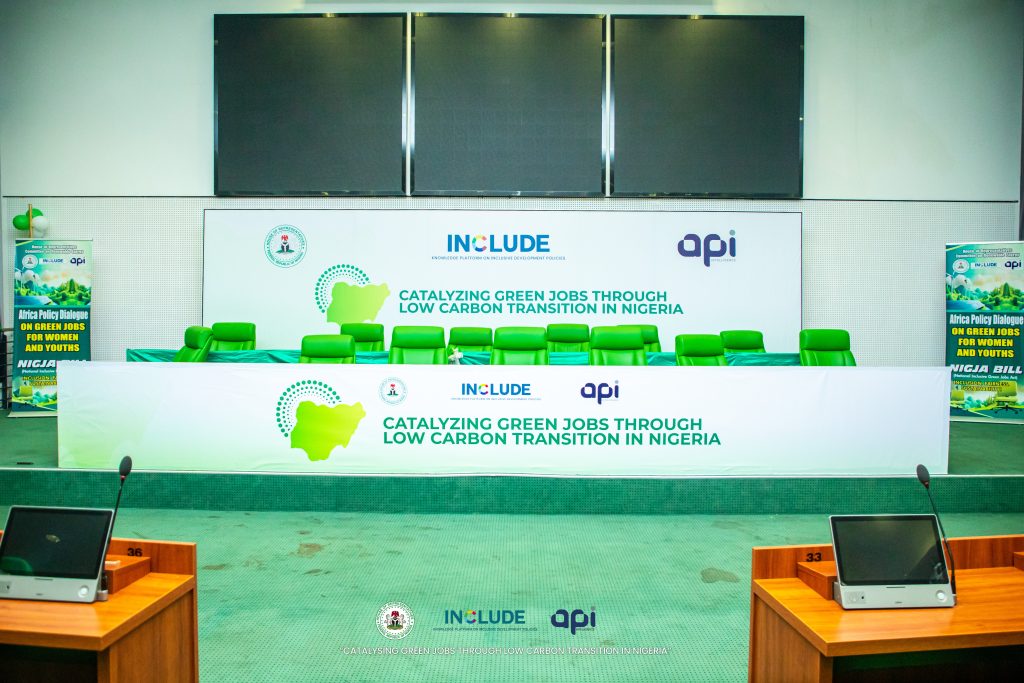
Nigeria’s Low Carbon Transition Commitments
Nigeria has expressed commitment towards decarbonising its economy and pursuing Low Carbon Transition (LCT) objectives (PwC, 2021). These have been substantiated by policy frameworks and plans that seek to enable access to clean energy while also tackling climate change. Some of these initiatives seek to enable an energy mix that can contribute to closing the country’s significant energy gap, given that over 140 million Nigerians (approximately 71% of the population) lack access to reliable electricity, clean cooking solutions, and safe, efficient fuels (World Economic Forum (WEF), 2023). As such, the Nigerian government has committed to achieving universal energy access by 2030, by pushing for a 50% renewable energy mix (Adigun, 2025).
An assessment of the existing policies, frameworks and plans to promote renewable energy towards LCT indicate a focus on energy efficiency and emission reduction goals. Policies include the National Renewable Energy and Energy Efficiency Policy (NREEEP) and the National Energy Efficiency Action Plan (NEEAP). There is also Nigeria’s Nationally Determined Contribution (NDC) which outlines emission reduction targets. Additionally, Nigeria launched the Nigerian Energy Transition Plan (ETP) in 2021, committing to achieve net-zero emissions by 2060. The ETP, updated in 2024 to include hydrogen infrastructure, serves as a comprehensive roadmap for decarbonizing key sectors such as power, cooking, transport, industry, and oil & gas. (SEforALL, 2024)
A core component of the updated plan is the development of 36 gigawatts of hydrogen capacity, positioning Nigeria to leverage emerging clean energy technologies for industrial and transport applications. Concurrently, the ETP signals a significant shift away from diesel, with the aim of phasing out 72% of diesel generators by 2030 (SEforALL, 2024). This reflects the government’s efforts to deprioritize diesel due to its environmental impact. The overarching goals of the ETP are to provide universal energy access by 2030, accelerate the deployment of renewable energy, and reduce greenhouse gas emissions, all while fostering economic growth. (SEforALL, 2024)
A Missed Opportunity
All of these show that Nigeria is already making crucial strides in the green economy. This then raises the question: How can we turn this into employment opportunities? How do we ensure that this low-carbon transition also generates socio-economic benefits that can impact the lives of those who need them the most? This is relevant because, globally, the transition towards a low-carbon economy is creating a wave of employment opportunities that are not limited to traditional environmental sectors but span a wide range of industries, including renewable energy, sustainable agriculture, green building, waste management, and ecotourism. (ILO, 2022). As such, there is an opportunity that must not be missed to ensure that LCT in Nigeria directly delivers socio-economic impact to the everyday Nigerian, and aligns with global employment opportunities.
Catalyzing Green Jobs Through Low Carbon Transition
This is the gap that the Africa Policy Dialogue aims to bridge. The APD aims to maximize Nigeria’s Low-Carbon Transition position by ensuring that it is not only environmentally sound but also economically inclusive, specifically by Catalyzing Green Jobs Through Low Carbon Transition. The APD seeks to achieve this by enabling the institutionalisation of green job policies, creating a structured workforce pipeline and supporting the mainstreaming of evidence-based policymaking aligned with Nigeria’s broader decarbonization and development agenda.
On July 24th, the APD kick-off workshop, in partnership with the House of Representatives Committee on Renewable Energy, INCLUDE Knowledge Platform, and Advocacy for Policy and Innovation. The workshop gathered several stakeholders to explore innovative solutions and policy frameworks for sustainable development towards a just, inclusive and equitable low-carbon framework in Nigeria.
This intervention by INCLUDE, API and the House Committee on Renewable Energy marks a critical point that frames Low Carbon Transition as a vehicle for inclusive growth and socio-economic impact. By aligning low-carbon strategies with job creation and access, Nigeria can turn its LCT objectives into careers and climate ambition into shared prosperity.
About the APD
Africa Policy Dialogues (APD) is a platform, driven by an INCLUDE Knowledge Platform, that supports structured conversations and interventions; and promotes knowledge exchange and evidence-based policymaking on a range of issues across Africa. In Nigeria, the ongoing APD focuses on Catalyzing Green Jobs Through Low Carbon Transition, and is implemented by Advocacy for Policy and Innovation in partnership with the House Committee on Renewable Energy.
References
- World Economic Forum (2023). How Nigeria is Tackling Barriers to its Green Energy Transition. Retrieved from https://www.weforum.org/stories/2023/05/how-nigeria-is-tackling-barriers-to-its-green-energy-transition
- Sustainable Energy for All (2024). Nigeria Energy Transition and Investment Plan Update. https://www.seforall.org/system/files/2025-05/Nigeria-ETIP-u.pdf
- Natural Resource Governance Institute. (2024). Guidebook on Nigeria’s Energy Transition. https://resourcegovernance.org/sites/default/files/2024-05/Guidebook%20on%20Nigeria%20Energy%20Transition.pdf
- International Labour Organisation (2022). How to Work in the Green Economy? Guide for Young People, Job Seekers and those who support them. https://www.ilo.org/publications/how-work-green-economy-guide-young-people-job-seekers-and-those-who-support
- Adigun Olalekan (2025). Tinubu Pledges 50% Renewable Energy Mix to Achieve Universal Energy Access by 2030. https://nairametrics.com/2025/01/28/tinubu-pledges-50-renewable-energy-mix-to-achieve-universal-energy-access-by-2030/
- PwC (2021). Decarbonising Nigeria’s Economy. https://www.pwc.com/ng/en/assets/pdf/decarbonising-nigerias-economy.pdf
